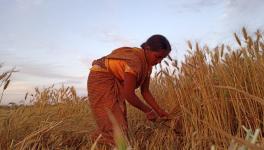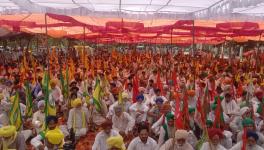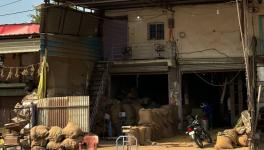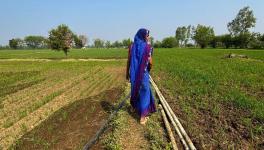COVID-19 in Rural India- XVI: Pension Transferred to Banks but Unable to Withdraw due to Lockdown in Punjab’s Shahpurian
Image use for Representational only. image Courtesy: Tribune India
This is the 16th report in a series that provides glimpses into the impact of COVID-19-related policies on life in rural India. The series, commissioned by the Society for Social and Economic Research, comprises reports by various scholars who have been conducting village studies in different parts of India. The reports have been prepared on the basis of telephonic interviews with key informants in their study villages. This article highlights the immediate impact of the lockdowin in Ramgarh Shahpurian village in Punjab’s Mansa district, where there is a breakdown of supply chains and labourers, artisans, marginal and small farmers have been adversely affected. While farmers are worried about the delays in harvest, daily wage workers are unable to find work even under MGNREGA.
Ramgarh Shahpurian village in Mansa district, Punjab, has 240 households and a total population of 1,250 (according to ASHA workers’ records). Jat Sikhs make up the majority of landowners and are engaged in agriculture. About 54% of the population of the village falls into either the Scheduled Caste or Backward Caste categories; these individuals are largely landless and work as agricultural labourers. Many in the village are also engaged in non-farm occupations either within the village or in nearby towns.
The major rabi crop in the village is wheat, and harvesting operations here are largely mechanised. According to one of the farmers, the mechanisation of the harvesting operations has reduced their dependence on labour, and there is enough labour available in the village to operate the machines. Also, since wheat is harvested earlier in Madhya Pradesh and Rajasthan than in Punjab, the owners of combine harvesters in Punjab used to often take the harvesters to those states, returning in the first week of April. But with the nationwide lockdown in place, the owner of a combine harvester reported that they are finding it difficult to return to Punjab.
In addition, the shortage of labour is likely to affect procurement markets, since unloading, packing, loading and other activities are performed by labourers, majority of them hailing from Uttar Pradesh and Bihar. Since the lockdown has prevented them from travelling, it is expected that the procurement process of wheat will be slow or delayed. Farmers are also unsure whether their crop will be procured at the minimum support price (MSP) on time or not.
Before the lockdown began, about 25 individuals from the village worked in nearby towns and cities as masons, carpenters, construction workers, painters, tailors, school van drivers and in repair workshops and so on. These individuals are all currently unemployed as they cannot travel outside the village. One of the respondents had been working as a mason in the nearby town; he is now ready to work in the village for lower wages, but there is no work because the police has stopped all construction work within the village. He has no source of income at present.
A panchayat member reported that about 200 households are registered under the MGNREGA scheme, but no work has been provided to anyone during the lockdown. Activities like the cleaning of panchayati khals for irrigation, the digging and cleaning of ponds and the maintenance of roads have all ceased during the lockdown.
The respondents said that there is no restriction on going to the fields for fodder collection, but even then farmers are short of the feed required for milch animals owing to an interruption to the regular supply from the city. The lack of transport during the lockdown is also affecting the selling of vegetables and milk, since there is no way to transport produce to markets.
In the absence of any bank or ATM in the village, the villagers used to visit the bank in the neighbouring village of Maghania, which is three km away. The bank was closed during the initial days of the lockdown, at which point villagers had no access to banking facilities at all. But the bank branch was reopened on March 30. There was a massive cash crunch due to overcrowding; some individuals were even stopped by the villagers from entering the village.
One respondent said that people also fear being assaulted by the police if they leave their homes or their villages, even to go to the bank. Some respondents have no ATM cards, while others who have cards, are unable to withdraw cash because they cannot access the ATMs located in nearby towns like Boha (ten km away) and Bareta (twelve km away). The government has transferred old age and other social security pensions to the bank accounts of beneficiaries, but these beneficiaries have been unable to visit the bank to withdraw their money. An individual from the village is in contact with the bank and has withdrawn pensions for the beneficiaries (for a commission of Rs 30 for every Rs 1,000 he withdraws).
The small shops in the village have only limited supplies of food and other essential commodities. While in the nearby city, the administration is allowing only a limited number of retail shops to open. Some vegetable vendors have been issued passes by the district administration. The prices of retail food items, including vegetables, have been rising due to a shortage in supply. The respondents reported that the villagers are helping each other, and food is being supplied to those who need it most by those who can afford to do so.
The respondents also reported a shortage of essential medicines, as there is no government-run primary health centre or even a pharmacy in the village. The lockdown announcement was made from the loudspeaker of the local gurudwara and the police have ensured the implementation of lockdown, but officials from the Health Department have not visited the village to educate the villagers on COVID-19. The village panchayat has sanitised the streets and other common areas on the directive of the office of the Block Development and Panchayat Officer (BDPO). On the instructions of the police department and panchayat, villagers are on duty patrolling the approaches to the village and restricting entry. But the respondents reported that there were no arrangements made for hand-washing or sanitisation at these barricades.
The outbreak of COVID-19 and the lockdown have pushed the rural economy into an uncertain and desperate situation.
[This report is based on interviews of ten respondents: two panchayat members, including an ASHA worker, two farmers, two labourers, the owner of a combine harvester, a mason and a carpenter. The interviews were conducted on March 31 and April 1, 2020.]
The author is a Research Fellow at the Department of Economics in Punjabi University, Patiala.
Get the latest reports & analysis with people's perspective on Protests, movements & deep analytical videos, discussions of the current affairs in your Telegram app. Subscribe to NewsClick's Telegram channel & get Real-Time updates on stories, as they get published on our website.
























